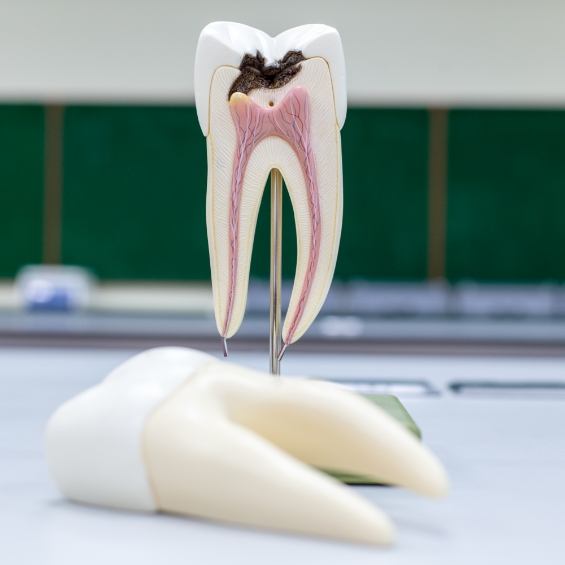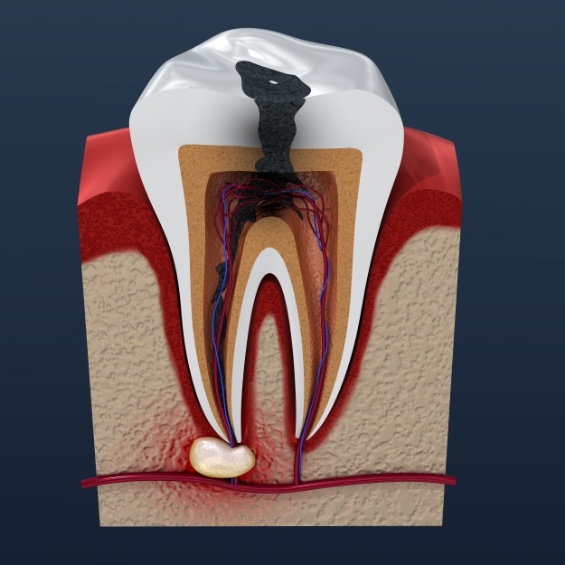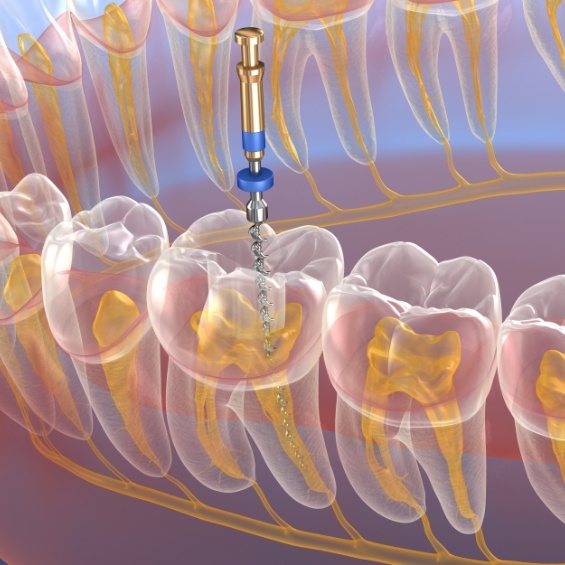Root Canal Treatment Simpsonville
Relieve Toothaches & Save Your Smile
At Tylan Creek Family Dentistry, we work hard to help patients from Simpsonville change the way they think about visiting the dentist. While our kind, knowledgeable dentistry team makes even the most anxious patients feel at home, there’s still one treatment the bravest patients dread – root canal therapy in Simpsonville, SC. We’ve got great news for you. Root canals actually relieve toothache pain and save teeth that would otherwise be extracted. If you want to learn more about root canal therapy or any of our other treatments, call our dental team to find out more or schedule a consultation. We almost always see patients who need a root canal on an emergency basis, so please don’t hesitate to call our team as soon as you notice any of the warning signs of root canal infection.
Why Choose Tylan Creek Family Dentistry for Root Canal Treatment?
- Detailed Digital Imaging for Accurate Treatment Planning
- Dentists with Advanced Training & Years of Dedicated Experience
- Natural-Looking, Metal-Free Restorations Available
When is a Root Canal Necessary?

Root canal therapy is also called endodontic treatment. Endodontics is one of the nine specialty areas within the field of dentistry. The word is a compound of “endo,” meaning inside, and “odont,” meaning tooth. The field of endodontics treats oral health concerns that affect the inside of the tooth. A root canal is a specific treatment that is recommended when patients have damage, decay, or infection that accesses the very innermost layer of the tooth called the pulp. Within the pulp, the tooth’s nerve system is housed. When damage or decay accesses this dental nerve, the result is the painful toothache and dental sensitivity that often precede the need for root canal therapy.
What are the Warning Signs of Root Canal Infection?

The only way to know for sure that you need a root canal is to visit a skilled dentist or endodontist for an examination. However, most patients needing root canal therapy are treated on an emergency basis because they notice one or more of the following warning signs:
- Severe toothache that can be dull and constant and/or sharp pain when biting down
- Dental sensitivity that begins when the tooth is exposed to heat or cold and lingers for several seconds after exposure
- Dark coloring, especially around the gumline, of one tooth
- Swelling, inflammation, discoloration, or infection in the gums around a single tooth
How is a Root Canal Completed?

Root canal therapy is completed throughout several appointments. In most cases, the first visit is an emergency appointment. Whenever possible, we’ll complete the first phase of treatment during this initial appointment to prevent any further pain. We begin by numbing the area around the tooth. Then, we drill a hole from the top of the tooth to the innermost layer, and we extract the pulp and nerve system through that access hole. If the tooth or surrounding tissue is infected, we may need to use oral or topical antibiotics to treat the tooth before continuing treatment. Once the infection is removed, we reseal the access hole. Then, a dental crown is placed to protect and strengthen the treated tooth.
Root Canal FAQs
How Long Does It Take to Recover from a Root Canal?
Since every case is unique, the recovery time for root canal therapy will vary from person to person. However, most patients can expect to return to their day-to-day activities following their root canal. Keep in mind that you’ll experience mild soreness and discomfort for the first few days after your procedure. Luckily, you manage those symptoms by taking your medications as directed and using cold compresses. While you heal, be sure to eat only soft foods and chew on the side of your mouth away from the root canal. If your job requires physical labor, you should request two to three days off as vigorous exercise can hinder the healing process.
How Much Pain Is Normal After a Root Canal?
Although the root canal procedure itself shouldn’t hurt, you’ll likely experience some discomfort and soreness over the next few days – especially after the anesthesia wears off. Fortunately, taking over-the-counter pain medication (like acetaminophen and ibuprofen) should be enough to manage it for most people. During your recovery period, you should avoid chewing hard foods as well, as it can worsen your discomfort. If your pain doesn’t fade after three days, you should contact your dentist for help.
What Happens If You Wait Too Long for a Root Canal?
Choosing not to seek treatment for a root canal will only cause your infection to get worse. So, if your dentist tells you that you need one, you should schedule your appointment right away. In some cases, the tooth pain will disappear after some time, making patients think that they no longer need treatment. However, that couldn’t be further from the truth. A toothache that’s mysteriously gone away often indicates that the infection has destroyed the tooth’s nerves. If you wait too long to get a root canal, your condition may get so bad that you’ll need an extraction.
Do Root Canals Ever Have to Be Redone?
Even though root canal therapy has an impressively high success rate, there’s still a small chance that your procedure will need to be redone at some point. Endodontic retreatment may be necessary for several reasons, such as saliva contaminating the tooth during the procedure or a delay between completing the root canal and having the restoration placed. Additionally, if your tooth had more root canals than expected, your dentist may not have disinfected all of them.
